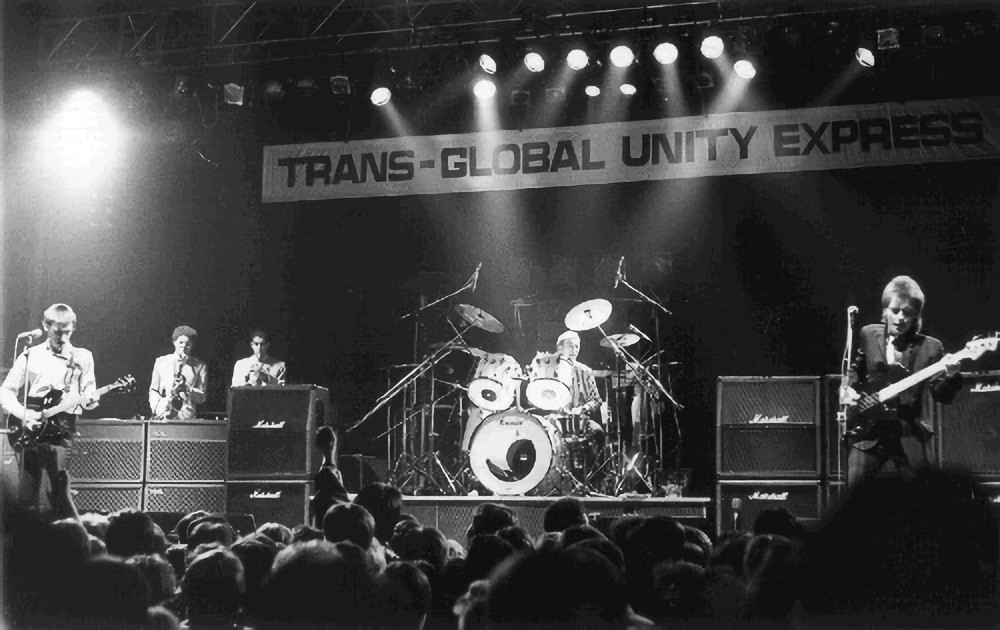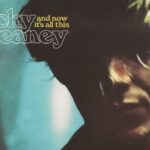
Rick Buckler reflects on The Jam’s final year, 1982, and the announcement of, and his view today, of Paul Weller and the split:
I remember one thing that struck me immediately, when I put myself back into 1982 was how we just got on with it. Do you know what I mean? We spoke about Paul leaving, and then we just got back into what we were doing, we immersed ourselves in the recording, we were in a recording studio, where Paul made the announcement. We got straight back into work. And it was almost not mentioned again, the reasons why Paul wanted to leave. That was the thing, I think people still scratch their heads over today is the reason, the reason. There was no reason. There was no great scheme. The reason that Paul gave us was about why he wanted to leave the band in that initial meeting was rubbish, basically. He said that he really felt like he was on a treadmill, and that he wanted to get off. But this was a treadmill that we wanted to get on. We always wanted to get on, we fought so hard to get on it. So to find somebody in the band saying, “Well, I want to get off now.” You think “Well, that’s crazy. That’s mad.” And of course the first thing you went and did was when and got onto a very similar treadmill. He re-signed with Polydor Records before the band had split and just carried on on the same treadmill. So that didn’t make any sense from the get go. And then when we heard in 1983, in the year after we split, that Paul had given it this sort of fairy story of, “Oh, I wanted the band to mean something.” I just thought to myself, it just struck me that there was something wrong here, that this was not a valid reason. I think I know what the reason was, I think a lot of it had to do with how the band was managed, because there was a lot of questions being asked about, “Why is it that, John [Weller – The Jam’s manager], and Paul had all this money, and me and Bruce didn’t have very much at all.
There was this first and second class citizen thing happening within our own band. We were beginning to ask questions, why am I driving around in this, this wreck of a car, and I can’t get out of Top of the Pops without the car breaking down. And it was just things like that. And also, on the other side of it, how we very gentlemanly accepted the fact that if Paul wanted to leave, we could deal with that, there was not a problem with that. So if that’s what he wanted to do, he was perfectly entitled to call it a day and to walk away from it. What I think annoyed me especially, was the rubbish that was talked about, he did it for some grand design. I’m sorry, but that’s just not holding any water with me at all. The more I think about it, and the more people ask me over the years, and I’m sure they’ve asked the same thing of Bruce, “Why did this happen?” There weren’t any musical differences. It wasn’t wanting to move on if there was because The Jam had stepped up to the mark and evolved in every possible way, musically, and songwriting and we tried lots of different things. We brought in brass sections. We were probably one of the most flexible bands in the world at the time, to be able to move to different areas and styles. As a band that’s working with itself, myself and Bruce as a rhythm section, we contributed a lot to the sound of the band.

That was a stark realisation when you listen to Style Council stuff. How bland it sounds to me, anyway. So I don’t think there’s any real bitterness why, if Paul wants to leave, fine. That’s absolutely fine. We can live with that. What annoys me, like I say, really, more than anything else, was the rubbish that was talked about, as if there was something to be covered up about why he was leaving. And I think a lot of it was to do with the way that the band was managed, the way that it was, sooner or later was going to mean not to be too blunt. But I think the shit would have hit the fan sooner or later. And I don’t think he really wanted to be in that scenario. So I think he pulled the plug first. That’s the only logical explanation. If you think of all the other arguments that don’t seem to hold water, that one seems to be the most logical reason really. Fine. It’s just because there was a lot that happened afterwards why we had to take the Wellers to court. The difficulty we had getting our royalties. And it was almost like somebody whispered in Paul’s ear, “You’re the band, you’re the only one that’s worth anything here, which was I don’t know, there’s a lot you can speculate, this is the problem.
There’s been so much speculation about the reasons why all these things came about. Another thing that came to my mind was, we used to look back on bands in the 60s and think, look at all these mistakes these bands made, management’s run off with all the money, ah ha, that wouldn’t happen to us, you know what I mean? There’s certainly a good story to be told for people who are forming bands now, that a good piece of advice is to learn the business, to know what you’re entitled to. And to know about the royalties and the different sorts of royalties that come in from a band and to know the business. A lot of people learn their instrument and stagecraft. But to actually learn the music industry, and the business and the way it’s run, is, I think, just as important for somebody’s career to know how to. It’s almost like business school, I suppose, in a way. So maybe there’s a tale to be told there that people coming into the industry should learn a lot about the industry as well as learning their own instrument.
Further information
The full interview is available here: Rick Buckler on The Jam 1982.
Rick Buckler is celebrating the publication of his new book The Jam 1982 with events around the country. Dates up so far are Gillingham, Glasgow, Dundee, Birmingham, Wimborne, London & Penzance. Tickets and information: thejamfan.net/events/
Also available: an audio version of this interview with Rick Buckler and Bruce Foxton podcast interview





Was at the Rainbow Finsbury Park 1979,great evening.the support band were the Vapours,think im turning Japanese.At the end of gig you chucked your drumsticks into the audience.I didnt get one.The JAM were an iconic band and played a big part in my adolecense.good luck.
Very interesting read from the drummer of the best band in the world.
This seems more like rambling fit for an analyst’s couch than for a music blog. With hindsight, it’s pretty clear that Weller left the band because he had outgrown it. And, why whine about differences in publishing royalties when it was one person in the band writing all the songs. That is how publishing contracts are generally structured, perhaps quite justly.
Buckler sounds like a bitter old fart after all these years. Even Bruce Foxton moved on from this a long time ago. I can understand being annoyed about not having royalties sorted out within the band. Having the singer’s father as the manager certainly worked against both Buckler and Foxton – isn’t that why they took the Wellers to court in the ‘90’s to get that sorted out? The ‘90’s are a long time ago. Whatever the reason Paul Weller gave to Buckler and Foxton, it was the right decision. People are still passionate about The Jam to this day – and rightly so. I’m not a fan of The Style Council myself but I have friends who love them to this day. And Weller’s solo career is outstanding – who can deny that? Seriously.
The truth is Weller wanted to move on, and he’s done that a few times since when he’s felt the need for change.
Buckler’s sour grapes are beneath him – has he ever wondered why Weller doesn’t have any contact with him while Weller and Foxton are on at least speaking terms?
Buckler – catch yourself on, and move on.
I`m with Buckler. He has every right to still feel peeved at Weller (and his father/manager) breakiing up one of the most successful bands ever. He and Foxton should not have had to fight to get paid. When one member of a band thinks he`s above the rest the rot sets in fast.
Like Buckler points out, leaving the Jam to start the bland boring-as-wallpaper The Style Council is ridiculous.
You only have to look back at the Jimi Hendrix Experience to see how two members were second class citizens. Yes, Hendrix died and it is different. But we all know how the two others lost out on subsequent royalties.
I`m with Buckler. Not something you can shrug off when a friend changes your life and fortune forever…
I think the way Weller ended The Jam & his subsequent behaviour says a lot about his character.
OK he wrote the overwhelming majority of the songs but Bruce and Rick were outstanding musicians and the band would never have achieved that level of success without them.
Weller had his reasons for leaving, though the largely dull & forgettable output of the Style Council didn’t seem to vindicate his decision. Just compare the number of plays for TSC on Spotify to The Jam & it speaks for itself.
More telling though was Weller’s attitude to his former bandmates. For decades he completely blanked them despite numerous attempts to make even the most basic contact. The royalties issue, particularly given Weller’s personal wealth was petty and likely vindictive. This all showed a huge empathy deficit.
For the fans, including myself, it’s been difficult to watch. I loved The Jam and still do. But like Rick, all these years later, I still feel sad about how things ended and the general atmosphere since. A reconciliation, even one gig, even one live performance and a group hug would be nice. It looks unlikely it will happen.